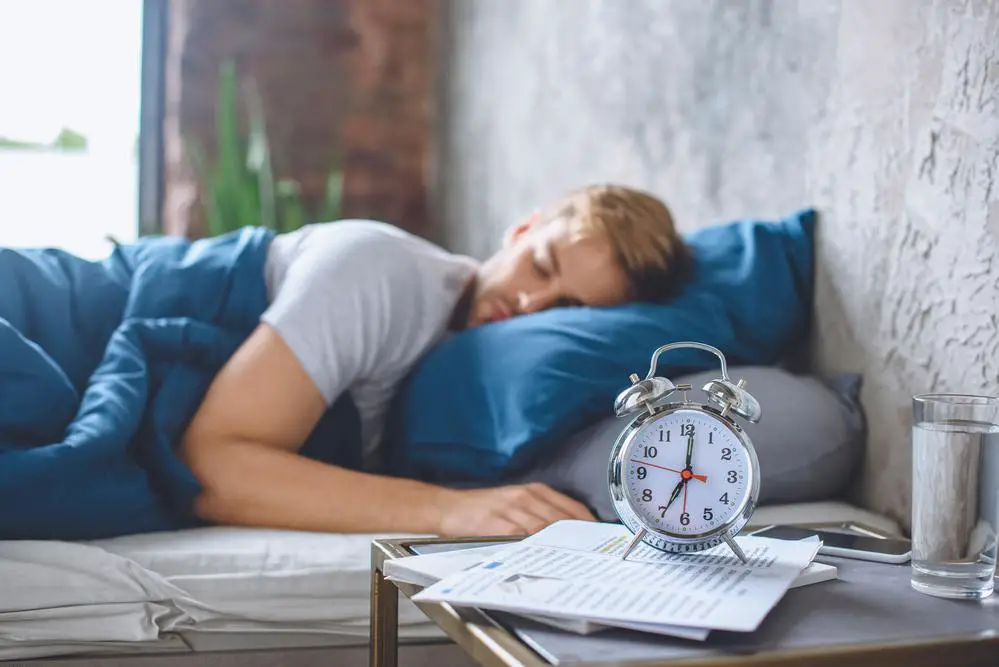As a BetterHelp affiliate, we receive compensation from BetterHelp if you purchase products or services through the links provided
Are you struggling to feel energized every morning? You’re not alone; many search for that elusive, perfect night’s sleep. This guide promises to unlock the secrets of an optimal rest schedule tailored just for you, including when to hit the pillow and rise and shine.
Keep reading – your best sleep awaits!
What Determines the Best Time to Sleep?
 Several factors come into play when determining the best time to hit the hay. This decision is critical to your body’s internal clock, circadian rhythm.
Several factors come into play when determining the best time to hit the hay. This decision is critical to your body’s internal clock, circadian rhythm.
This natural timer helps regulate feelings of sleepiness and wakefulness over 24 hours. Aligning your sleep schedule with your body’s circadian rhythm can lead to better quality rest and feeling more alert during the day.
Personal habits also dictate when to turn off the lights for optimal rest. Engaging in physical activity during the day can promote a night of more restful sleep while sticking to a consistent bedtime each night trains your body to wind down at that same time regularly; both are critical components of good sleep hygiene.
Optimal Sleep Schedule
Finding your optimal sleep schedule is a cornerstone of good health. Here’s what a balanced sleep routine could look like:
| Time of Day | Activity |
| 10:00 PM | Begin winding down for bed, aiming to fall asleep by this time. |
| 10 PM – 2 AM | Deep sleep occurs, which is crucial for physical recovery and hormone regulation. |
| 2 AM – 4 AM | Body temperature drops, promoting restorative sleep. |
| 4 AM – 6 AM | Rapid Eye Movement (REM) sleep stages dominate, fostering brain health. |
| 6:00 AM | Wake up naturally or with an alarm, getting a complete rest cycle. |
| 6:10 AM | Engage in a morning routine, keeping the wake-up time consistent every day. |
| Throughout the Day | Stay active and expose yourself to natural daylight to reinforce your body’s sleep-wake cycle. |
| 3 PM (if needed) | Take a short nap of 20 to 30 minutes to rejuvenate without disrupting nighttime sleep. |
Remember that while the above reflects an ideal schedule, individual needs may vary. Adjustments are encouraged to ensure the best quality rest for your specific lifestyle.
Finding Your Ideal Sleep Routine
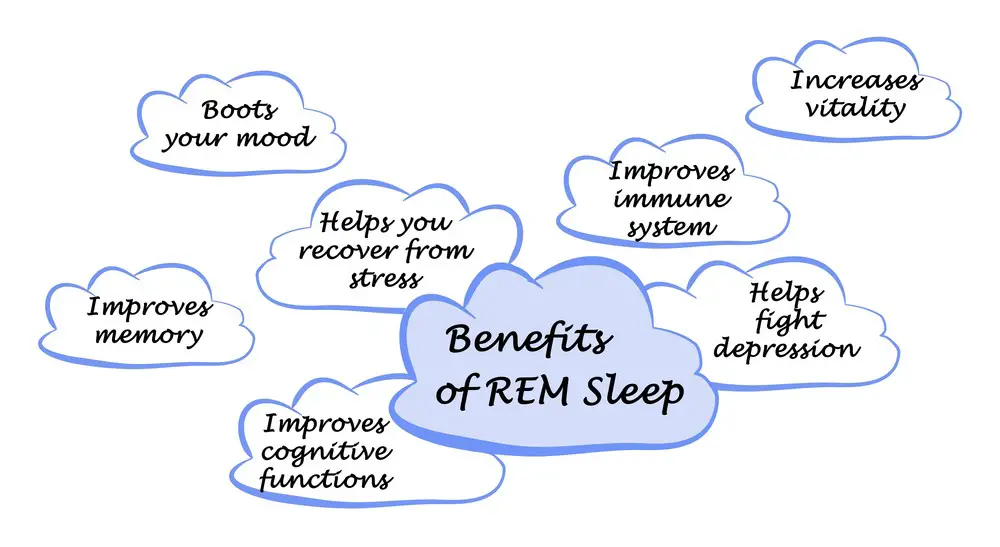 Getting enough quality sleep is extremely important for both physical and mental health. However, many struggle to find a sleep routine that works well for them. The key is experimenting to discover your ideal.
Getting enough quality sleep is extremely important for both physical and mental health. However, many struggle to find a sleep routine that works well for them. The key is experimenting to discover your ideal.
Think about what time you need to wake up, then work backward. Determine how much sleep you need to feel rested (most adults require 7-9 hours). Given your wake-up time and sleep needs, you can set an ideal bedtime. Stick to this schedule, even on weekends – irregular sleep negatively impacts health.
Next, optimize your sleep environment. Things like temperature, noise level, and light exposure affect sleep quality.
Make your bedroom cool, quiet, and dark. Consider using blackout curtains, a white noise machine, and keeping devices out. Also, reserve your bed only for sleeping – not TV watching. This conditions your body to associate your bed with sleep.
Additionally, watch what you consume before bedtime. Caffeine, alcohol, and heavy foods too close to bed make quality sleep unlikely. However, relaxing teas, light snacks, or supplements like melatonin can help initiate drowsiness. Experiment to find what works best.
Finally, establish a pre-bed routine that signals your brain and body that sleep will come soon. Activities like light yoga, reading, or meditation help transition into sleep. Repeat this sequence every night.
These tips can help design an ideal sleep routine tailored to your needs and lifestyle. With some commitment, healthy, restorative sleep is within reach.
Sleep and Wake Times for Peak Performance
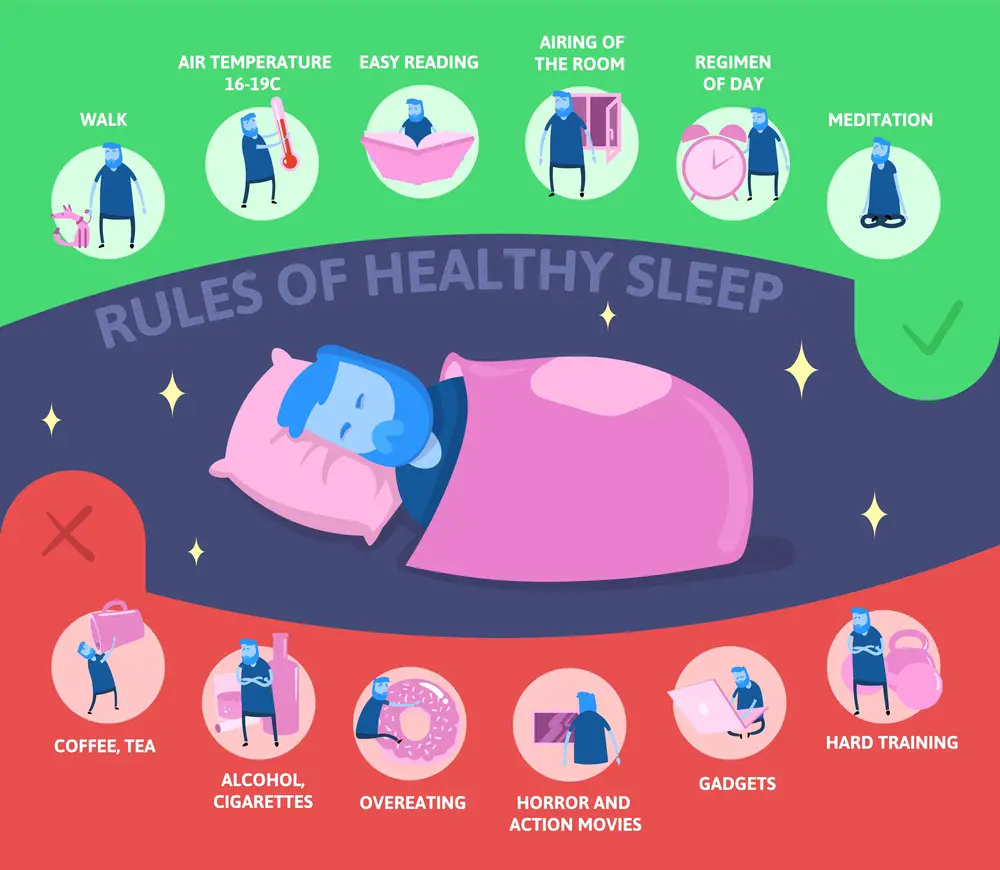
Establishing a sleep schedule that promotes optimal performance can be a game-changer. Consider the adage that every hour of sleep before midnight is worth two after midnight when planning your rest.
Here’s a simple guide to help you find the ideal sleep and wake times for peak performance:
| Sleep Duration | Bedtime | Wake-up Time | Notes |
| 7-8 hours (Adults) | 10:00-11:00 PM | 6:00-7:00 AM | Aligns with natural circadian rhythms for restorative sleep. |
| Short Nap | Right after lunch or around 2-3 PM | At most 30 minutes after napping. | 20-30 minutes to refresh without deep sleep. |
| Consistent Schedule | Same Nightly | Same Daily | It is necessary even on weekends for better sleep quality. |
This table is an at-a-glance reference to help you plan for the most rejuvenating sleep possible. Tailor these times based on your needs and lifestyle for the best results.
The Science of Sleep Patterns
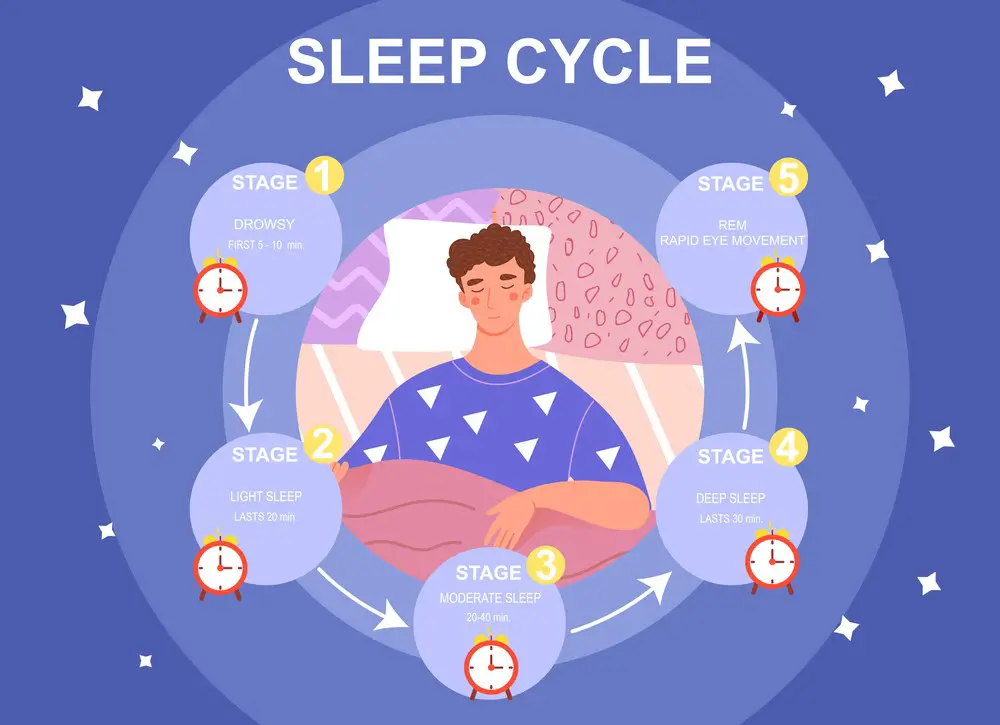 Sleep patterns are complex and involve multiple stages, including REM (rapid eye movement) sleep. During a typical night, the body cycles through these stages several times. Each cycle includes less deep sleep and more REM sleep as the night progresses.
Sleep patterns are complex and involve multiple stages, including REM (rapid eye movement) sleep. During a typical night, the body cycles through these stages several times. Each cycle includes less deep sleep and more REM sleep as the night progresses.
REM is crucial for consolidating memories and processing emotions. Disrupting these cycles, such as through irregular bedtimes or all-nighters, can lead to feeling groggy or out-of-sorts during the day.
Humans have a built-in circadian rhythm that influences when we feel awake and sleepy for over 24 hours. This natural clock responds to cues like light exposure and meal times to help keep us on track.
Producing melatonin at certain times helps signal our bodies it’s time for restful sleep. Adhering to consistent bedtime routines aligns with this rhythm, improving sleep health and making those 7 to 8 hours of recommended nightly rest work in our favor for optimal daily functioning.
Maximizing Productivity with Sleep Habits
Adopting consistent bedtime can boost your productivity to new heights. Hitting the sheets at the same hour each night and waking up regularly at dawn, even on weekends, stabilizes your internal clock.
Your body thrives on routine; when you sync your sleep schedule with this natural rhythm, you wake up clearer-headed and ready for action.
Incorporate physical activity into your day to deepen restful slumber and amplify focus during waking hours. A brisk afternoon walk or gentle evening yoga helps signal your body that it’s time to wind down.
Remember that most adults need 7 to 8 hours of sleep – aligning with these recommendations ensures you’re working hard and smartly leveraging rest for success.
Unveiling the Secrets of Quality Rest
A regular nighttime routine is the first step in getting enough sleep. Maintaining a consistent bedtime schedule, even on the weekends, can significantly enhance the quality of your sleep by assisting your body’s clock.
Short naps during the day should be long enough to rejuvenate you without causing sleep inertia or affecting night-time restfulness. Experts suggest a 20-to-30-minute nap for an ideal quick energy boost.
Creating a restful environment is also crucial for high-quality slumber. Keep your bedroom dark, cool, and quiet to signal to your brain that it’s time to wind down. Limiting screen time before bed allows melatonin levels to rise naturally, preparing you for sleep.
As we discuss how to align your body clock for better slumber in the next section, think about how these elements play a role in optimizing your rest cycle.
Aligning Your Body Clock for Better Sleep
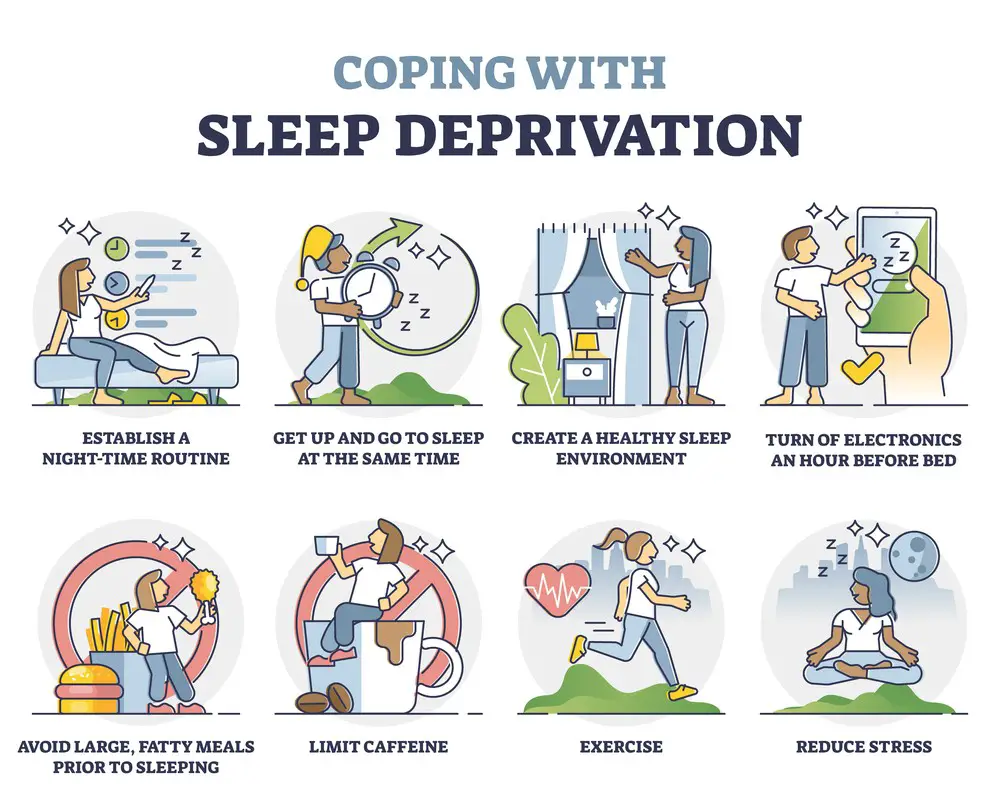 Getting good sleep is vital for both physical and mental health. However, many fail to align their sleep routine with their natural body clock. Doing so can significantly improve sleep quality.
Getting good sleep is vital for both physical and mental health. However, many fail to align their sleep routine with their natural body clock. Doing so can significantly improve sleep quality.
Firstly, determine your chronotype – are you a morning lark who wakes early or a night owl? Understand your natural energy cycles so you can work with, not against, your body. Go to bed when your body signals sleepiness, not by the clock.
Ensure plenty of bright light exposure in the mornings. The light stops melatonin production, making you feel alert. Dim lights in the evening will boost melatonin and prepare you for sleep. Therefore, darkness at night and brightness during the day align with your rhythm.
Establish a consistent sleep and wake-up time that syncs with sunlight. Even slight schedule changes on weekends disrupt your body clock. Maintain regularity instead.
Furthermore, avoid caffeine late in the day as it can block tiredness. Nicotine and alcohol also hamper quality sleep.
Understanding your chronotype and leveraging light exposure, consistency, and healthy habits help align your sleep-wake cycle. This brings better sleep, energy, and well-being.
Discovering the Perfect Sleep-Wake Balance
Achieving the perfect sleep-wake balance is an essential component of a healthy lifestyle. Understanding and respecting your body’s natural rhythms can unlock the door to restorative sleep and daytime vitality.
This balance involves more than just adhering to a fixed sleep schedule; it requires a holistic approach considering your unique physiological needs, lifestyle habits, and environmental factors.
Listening to your body’s signals for sleepiness and wakefulness helps you to fine-tune your bedtime and waking hours, ensuring that you’re not just clocking in hours in bed but are genuinely rejuvenating through quality sleep.
Incorporating mindfulness and relaxation techniques before bed can further enhance your ability to fall asleep quickly and deeply.
Similarly, maintaining a lifestyle that promotes healthy sleep—including regular physical activity, a balanced diet, and minimal exposure to screens before bedtime—supports your body’s natural sleep-wake cycle.
Turning the Page: When Sleep Challenges Call for Expert Intervention
 Embarking on the journey to find your perfect sleep-wake balance, you’ve armed yourself with knowledge about optimal sleep schedules, the science behind sleep patterns, and strategies for maximizing rest. Yet, for some, the quest for quality sleep may uncover challenges that simple adjustments can’t resolve. This section is dedicated to helping you recognize when it’s time to seek professional help and understand the paths of therapy and medication for sleep issues.
Embarking on the journey to find your perfect sleep-wake balance, you’ve armed yourself with knowledge about optimal sleep schedules, the science behind sleep patterns, and strategies for maximizing rest. Yet, for some, the quest for quality sleep may uncover challenges that simple adjustments can’t resolve. This section is dedicated to helping you recognize when it’s time to seek professional help and understand the paths of therapy and medication for sleep issues.
Recognizing the Need for Professional Help:
- Consistently Poor Sleep Quality: If you find yourself tossing and turning night after night despite adhering to recommended sleep habits.
- Daytime Dysfunction: Feeling persistently tired, irritable, or unable to concentrate during the day may indicate underlying sleep disorders.
- Dependency on Sleep Aids: Reliance on over-the-counter or prescription sleep aids to get through the night could signal deeper issues.
Navigating the Crossroads: Therapy or Medication?: Deciding between therapy and medication can feel daunting, but understanding who benefits from each can clarify your next steps.
- Therapy Benefits:
- Tailored Strategies: Cognitive Behavioral Therapy for Insomnia (CBT-I) offers personalized techniques to combat sleep issues, addressing behaviors and thought patterns affecting sleep.
- Sustainable Solutions: Therapy aims to equip you with long-term skills for managing sleep health beyond the temporary fix.
- Who Benefits: Ideal for individuals seeking to address the root causes of sleep disturbances without immediate reliance on medication.
- Medication Benefits:
- Immediate Relief: Medications can provide quick, short-term relief for those struggling with severe insomnia or other sleep disorders.
- Adjunct to Other Treatments: Sometimes used in conjunction with therapy, especially for those whose sleep issues severely impact daily functioning.
- Who Benefits: Best suited for individuals needing swift symptom management to restore a minimum level of sleep quality and function.
Embarking on Your Journey to Restful Nights:
- Professional Consultation: A healthcare provider can offer a comprehensive assessment to determine the nature of your sleep issues and recommend an appropriate treatment plan.
- Consider Your Goals and Preferences: Reflect on your long-term health goals, treatment preferences, and the sustainability of outcomes when choosing between therapy and medication.
Embracing the Night with Open Arms
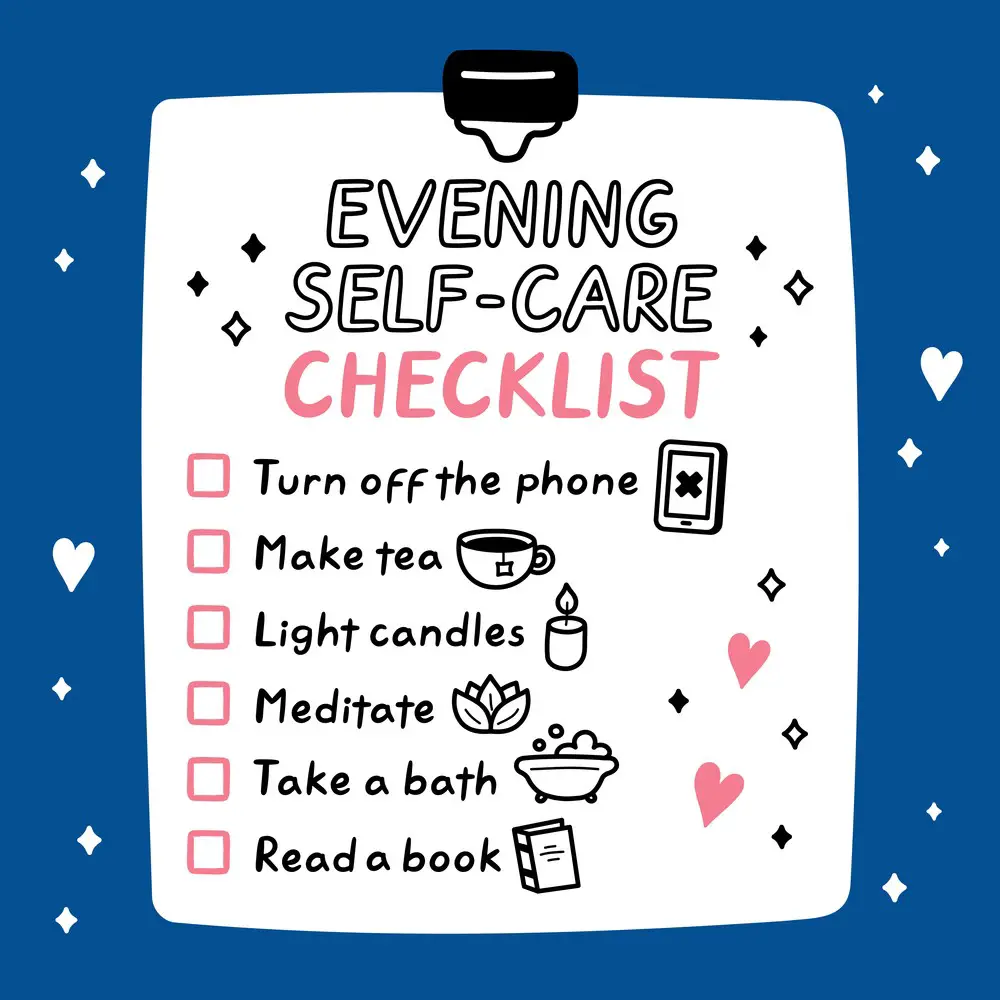 As you embark on a journey to conquer sleep challenges, remember that reaching out for help is a sign of strength. Whether through therapy, medication, or a blend of both, addressing sleep issues is pivotal in achieving rest and quality of life. Here’s to nights filled with peaceful slumber and days brimming with vitality, knowing that when sleep eludes you, pathways to support and solutions are within reach.
As you embark on a journey to conquer sleep challenges, remember that reaching out for help is a sign of strength. Whether through therapy, medication, or a blend of both, addressing sleep issues is pivotal in achieving rest and quality of life. Here’s to nights filled with peaceful slumber and days brimming with vitality, knowing that when sleep eludes you, pathways to support and solutions are within reach.
Final Thoughts
Understanding and aligning with your body’s circadian rhythm is vital for optimal rest. The best time to sleep varies among individuals, but the goal remains: to achieve deep, restorative sleep that energizes the body and sharpens the mind.
You can enhance your sleep quality and overall health by creating a personalized sleep routine that includes consistent sleep and wake times, preparing a conducive sleep environment, and adopting habits that support your natural rhythms.
Embrace the power of good sleep hygiene and let it transform your waking hours into a more productive and vibrant part of your life.
- 3 Ways Wearing a Hat Can Help Lower Your Stress Levels - April 19, 2025
- Breaking the Silence: Why Men’s Mental Health Matters More Than Ever - April 15, 2025
- How to Transform a Home’s Patio Space into a Relaxing Space - March 23, 2025
This site contains affiliate links to products. We will receive a commission for purchases made through these links.

